- Home
- Burt L. Standish
The Trail of the Seneca Page 2
The Trail of the Seneca Read online
Page 2
CHAPTER II--A SENTENCE OF DEATH--ACCUSED OF WITCHCRAFT
"Big Buffalo would have nothing to do with the Harvest Festival asLone-Elk planned it and the Seneca has killed him," was in substance thereport which quickly passed among the Delawares when Little Wolf hadcome running to the village, telling of the discovery he hadmade--telling how he had found the dead body among the brush and reedsas he went in search of an arrow idly sent flying from his bow, afterthe exercises in the Council House were over.
The finger pointed at him as he had come up, though hastily pushedaside, was enough to tell Lone-Elk that he was suspected, even if noword had been spoken.
"Is it said that Lone-Elk killed Big Buffalo?" the Seneca demanded ofthe Indian who told to him the news.
"Big Buffalo would not come into the Council House for the HarvestThanksgiving that was planned by Lone-Elk," said another of theDelawares. "It is this that they say."
The scowl on the Seneca's face became more bitter and contemptuous. Witha look of disdain he left the group, fast increasing in numbers abouthim, and walked with head held high directly to the lodge of CaptainPipe.
The finding of Big Buffalo dead had put a sudden damper on the day'sfestivities. The squaws discontinued their preparations for the feast,and while the young bucks and warriors gathered about to discuss themysterious death of one of the best known, though by no means bestliked, of their number, children clung about their mothers' knees as thelatter also flocked from lodge to lodge to talk of the strangediscovery.
There were few outward signs of excitement or emotion,--that was a thingthe Indians rarely showed. But in a cold, impassive way every person inthe village was keenly interested. Never had there been so disturbing athing at a time of festivity before.
Many eyes turned toward Lone-Elk as he strode toward Captain Pipe'slodge and entered the hut. Even as he did so two warriors, still inholiday garb, came carrying the body of Big Buffalo between them.Without a word they bore the corpse to the home it had always known inlife, where lived the dead man's mother--an old, old woman now, wholoudly lamented the death of her son as she sat on the ground justwithin the tumble-down bark lodge.
"Big Buffalo is found dead," said Lone-Elk to Captain Pipe.
A look and significant shrug of the shoulders was the only answer.
"If one dies when a festival is prepared, the custom is to put the bodyby,--to say to the sorrowful, 'We will mourn with you another time; joinin the feasting with us till the festival is over.' It is an old, oldcustom," Lone-Elk said. "When the festival is over, also, it may beasked, 'How did Big Buffalo die?'"
"The custom is to kill him who kills another without the right of warand not in fair fight. It is a good custom," Captain Pipe made answerand looked at the Seneca searchingly.
"Lone-Elk did not kill Big Buffalo," the younger Indian said in answerto the chief's questioning look, and his voice was icy cold.
"If Lone-Elk did not kill Big Buffalo," Captain Pipe returned in thesame manner, slowly and sternly, "then shall Lone-Elk find him that didkill Big Buffalo. Let him come not back until he has done this. TheDelawares have no fear of any living creature; but no Delaware kills oneof his own people. With the Senecas it is not always so."
For a moment Lone-Elk's sharp eyes scrutinized the chief's face as if hewould find a double meaning in the Delaware's closing sentence. Could itbe that Captain Pipe knew his whole history--knew the reason he returnedno more to his own nation? But quickly he answered the older Indian'sscathing words, and his voice was harsh and bitter as he said:
"Does Captain Pipe think, then, that because Big Buffalo, like a whippeddog, slunk away and would not appear in the Festival of the Harvest, themind of Lone-Elk was poisoned against him? In his own breast doesCaptain Pipe find lodgment for the thought that so petty a thing couldturn a Seneca to anger? No! Hear me! Lone-Elk but smiled at thechildishness of Big Buffalo."
"Let Lone-Elk show the Delawares how Big Buffalo died," the chiefhaughtily answered, and his tones were a challenge. Even as he spoke,too, he turned his back to the Seneca and the latter, clenching histeeth to suppress the angry words he thought, wheeled about and left thelodge.
As Lone-Elk walked quickly to his own lodge he plainly noticed that nota friendly eye was turned toward him. His own glances the Delawaresevaded by looking the other way, but he knew full well that they turnedto gaze after him when he had passed, and he felt the things they weresaying of him. It was a desperate situation. The charge of murder mightquickly be followed by the charge of witchcraft, and that could meanonly a choice between flight and death.
Indeed, to hoodwink the Delawares long enough to permit him to get awayfrom them never to return seemed to the Seneca for the moment his wisestcourse. Still, how had Big Buffalo died? If his death was from naturalcauses could he not quickly prove such to have been the case, and then,the Delawares admitting it, rebuke them for their suspicions? That wouldbe excellent! Nothing could help him more in his keen desire for arecognized position of permanent leadership.
All in a twinkling these thoughts crowded upon the brain of Lone-Elk.They restored his great self-confidence and his feeling of superiority.Looking neither to right nor left, he walked with all the dignity of hishaughty nature to the hut where the body of the dead Indian lay. With afew soothing words to the lamenting squaws about the door, he enteredthe rude shelter and bent low over the silent figure of the departedwarrior. Even as he did so a new thought came to the Seneca and hegloomily shrugged his shoulders as if to conceal his delight from thosewho might be watching.
Slowly Lone-Elk examined the half-covered body of Big Buffalo andsilently nodded his head as if he found only that which he expected tofind.
"See," he said very calmly to the women and to Fishing Bird and one ortwo other braves who had drawn near,--"see, no bruises. A witch haskilled Big Buffalo. It is as Lone-Elk says. Only a witch's power cankill a warrior so."
"A witch--Big Buffalo killed by a witch!" The word was spread about thevillage with the speed of the wind.
Many of the Indians and Captain Pipe among them gathered about theSeneca.
"It is as Lone-Elk supposed. It is as Lone-Elk now says; a witch haskilled Big Buffalo," he boldly declared. "Listen to my words. Lone-Elkknows the hand which struck a warrior of the Delawares down. Lone-Elkalone can tell how Big Buffalo died; but the Delawares well know thecustom of the people of the Long House [the Iroquois] and of all theIndians, that witches shall be put to death."
There was a stir of ill-suppressed excitement. Lone-Elk was using strongwords. Whom would he accuse? To be accused of practicing witchcraft wasnothing short of a sentence of death. The accusation was itselfsufficient. No evidence was necessary.
"Lone-Elk knows the hand which reached out to wither the strength of BigBuffalo, even as flowers are turned black by cold," the Seneca went on,slowly and solemnly. "When the speeches and the dancing in the CouncilHouse were over Lone-Elk walked to cool himself beside the water. Acrossthe lake he saw in a canoe the young Palefaces who have come unbiddenhere to cut down the trees and drive off the game which belong only tothe Indians,--even as others of the Longknives have done in the landswhere lived our fathers. Two of the Palefaces there were when Lone-Elkfirst saw them.
"Again Lone-Elk looked and only one was there--only one Paleface in thecanoe; but over the water floated a cloud of foul-smelling vapor. Nearerand nearer the cloud came. Soon it passed into the woods. Again didLone-Elk look. Again the cloud appeared and as it moved across the quietwaters drew near the canoe in which there still was but one of the twoPalefaces.
"And even as Lone-Elk watched a strange thing happened. Quick as theleap of a frightened deer was the cloud changed to the form of a bird--alarge, black bird with heavy, beating wings. Straight to the canoe thegreat bird flew. Still Lone-Elk watched closely and held his breath hardwith wonder. Once, twice the strange bird circled about the solitaryPaleface, then flew swiftly into the canoe. Instantly there appeared twoyoung Palefaces where only one had been
before. And the bird,--the big,black bird was gone. In his hands the Paleface witch--he you call'Little Paleface' it is--held a tomahawk.
"The sun shone bright upon it and even far across the water did Lone-Elksee the red blood still wet and shining. Not then did Lone-Elk know. Notthen did Lone-Elk guess the awful thing which happened. Now does heknow--now do all the Delawares know how came Big Buffalo to die."
There was a stir followed by a deeply threatening murmur among theassembled Indians. It boded ill--ah, ill indeed,--to the young whitepioneers.
Flushed with the success of his narrative and vain to find himself sohearkened to, even by those who a little while before were his accusers,the Seneca would have added to his extraordinary story and elaboratedupon the many fearsome shapes the cloud assumed of which he told. Thewords were in his mind but he hesitated to try the credulity of theDelawares further. Yet speak he must. The Indians still pressed nearer.They would hear more; and Lone-Elk therefore continued.
"The witch must die. If only one Paleface is bewitched then only onemust die. Let all the Delawares hear now and remember. Lone-Elk willkill him that killed Big Buffalo--and the White Fox as well, if theWhite Fox is also a witch as his brother that you call 'LittlePale-face' is."
If any of the Indians doubted the words of the Seneca, none showed it.Few red men there were who did not believe in witchcraft and Lone-Elkhad made his tale just fanciful and weird enough to win and hold theirfaith in all his declarations.
In those days too, not only among the Delawares but among more advancedIndian nations as well, witchcraft was more than a mere superstition. Itwas feared and hated as an actually existing thing, more awful than themost deadly disease. The declaration of any one Indian that another wasa witch was almost certain to be followed by the killing of the oneaccused. It was the duty as well as the privilege of the accuser to takethe other's life.
Little wonder is it, when these circumstances are considered, thatLone-Elk's declarations, made in the most convincing and emphatic mannerof which his eloquence was capable, made a deep impression! Many werevisibly frightened. The thought that soon they might be struck down,even as Big Buffalo had been, was far more disquieting than to face afoe in hand-to-hand combat.
One of the Delawares there was, however, who went quietly away soonafter Lone-Elk had finished speaking, and as if only loitering about,came presently to his own hut. Here he removed the gayest part of theholiday dress he wore, including the sash of scarlet cloth--relic ofsome plundered settlement, no doubt--and with his gun over his shouldersauntered again through the village as if he were starting out to hunt.
This Indian was Fishing Bird. He found Lone-Elk still talking,--stillsurrounded by an attentive, awestruck throng. When the Harvest Festivalwas over, the Seneca was saying, then would be the time to mourn BigBuffalo's death and then the time to avenge his murder. It was an old,old custom, he went on, that if one died when a festival was beingenjoyed, the body should be laid aside until the season of themerrymaking was over. Addressing Captain Pipe directly, he appealed tothe chief to say if the ancient custom should not now be observed.
The leader of the Delawares saw plainly that Lone-Elk's proposal pleasedhis people.
"Then shall it be as the Seneca says," he made answer, and waiting tohear nothing more, Fishing Bird, with a glance across the lake to makecertain the white boys were still fishing near the far-away shore,turned slowly into the woods. He walked with lagging steps only untilthe village was left well behind, then eagerly dashed forward at a run.

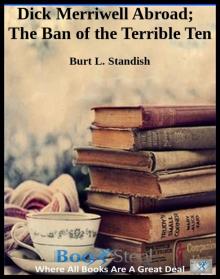 Dick Merriwell Abroad; Or, The Ban of the Terrible Ten
Dick Merriwell Abroad; Or, The Ban of the Terrible Ten Wild Adventures round the Pole
Wild Adventures round the Pole Storm-Bound; or, A Vacation Among the Snow Drifts
Storm-Bound; or, A Vacation Among the Snow Drifts In the Yellow Sea
In the Yellow Sea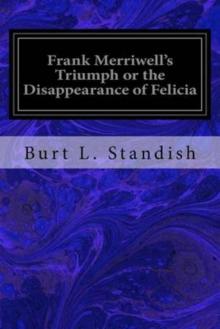 Frank Merriwell's Triumph; Or, The Disappearance of Felicia
Frank Merriwell's Triumph; Or, The Disappearance of Felicia Treasure of Kings
Treasure of Kings Bert Wilson's Twin Cylinder Racer
Bert Wilson's Twin Cylinder Racer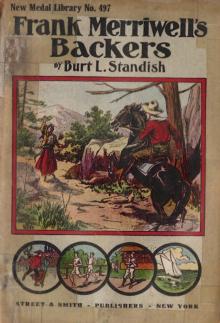 Frank Merriwell's Backers; Or, The Pride of His Friends
Frank Merriwell's Backers; Or, The Pride of His Friends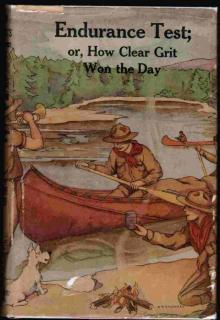 Endurance Test; or, How Clear Grit Won the Day
Endurance Test; or, How Clear Grit Won the Day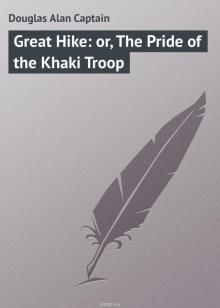 Great Hike; or, The Pride of the Khaki Troop
Great Hike; or, The Pride of the Khaki Troop The Swan and Her Crew
The Swan and Her Crew A cup of sweets, that can never cloy: or, delightful tales for good children
A cup of sweets, that can never cloy: or, delightful tales for good children Frank Merriwell's Bravery
Frank Merriwell's Bravery Frank Merriwell Down South
Frank Merriwell Down South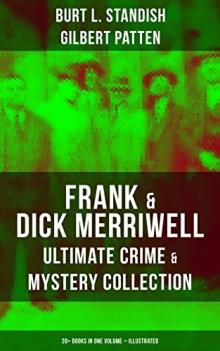 Dick Merriwell's Trap; Or, The Chap Who Bungled
Dick Merriwell's Trap; Or, The Chap Who Bungled The Trail of the Seneca
The Trail of the Seneca Wild Life in the Land of the Giants: A Tale of Two Brothers
Wild Life in the Land of the Giants: A Tale of Two Brothers From Squire to Squatter: A Tale of the Old Land and the New
From Squire to Squatter: A Tale of the Old Land and the New The Cruise of the Snowbird: A Story of Arctic Adventure
The Cruise of the Snowbird: A Story of Arctic Adventure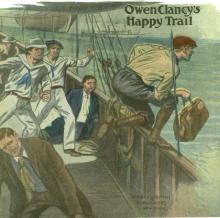 Owen Clancy's Happy Trail; Or, The Motor Wizard in California
Owen Clancy's Happy Trail; Or, The Motor Wizard in California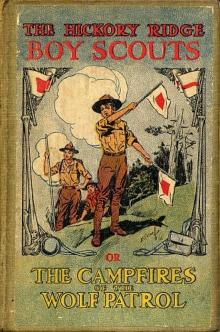 Boy Scouts: Tenderfoot Squad; or, Camping at Raccoon Lodge
Boy Scouts: Tenderfoot Squad; or, Camping at Raccoon Lodge Sing a Song of Sixpence
Sing a Song of Sixpence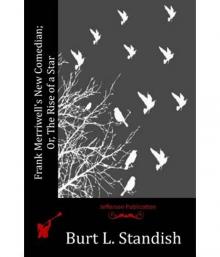 Frank Merriwell's New Comedian; Or, The Rise of a Star
Frank Merriwell's New Comedian; Or, The Rise of a Star The Sa'-Zada Tales
The Sa'-Zada Tales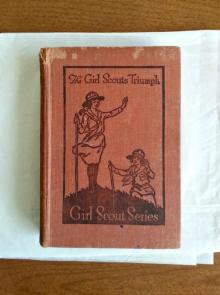 The Girl Scout's Triumph; or, Rosanna's Sacrifice
The Girl Scout's Triumph; or, Rosanna's Sacrifice Wild Adventures in Wild Places
Wild Adventures in Wild Places Fairies I Have Met
Fairies I Have Met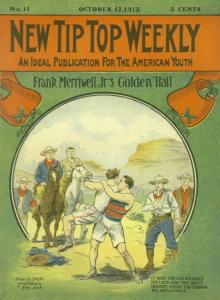 Frank Merriwell's Son; Or, A Chip Off the Old Block
Frank Merriwell's Son; Or, A Chip Off the Old Block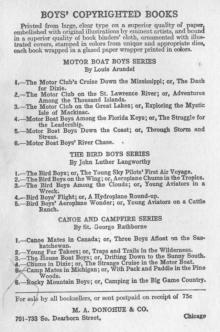 Motor Boat Boys' River Chase; or, Six Chums Afloat and Ashore
Motor Boat Boys' River Chase; or, Six Chums Afloat and Ashore Frank Merriwell's Athletes; Or, The Boys Who Won
Frank Merriwell's Athletes; Or, The Boys Who Won Bart Keene's Hunting Days; or, The Darewell Chums in a Winter Camp
Bart Keene's Hunting Days; or, The Darewell Chums in a Winter Camp Captain June
Captain June